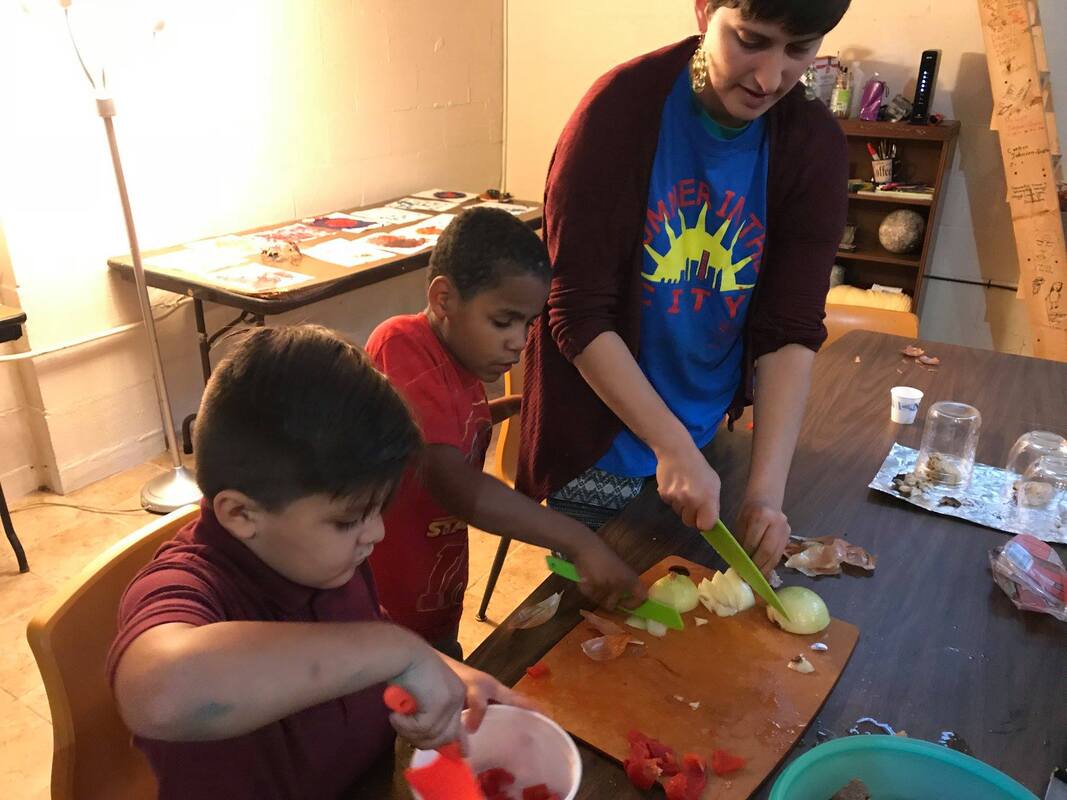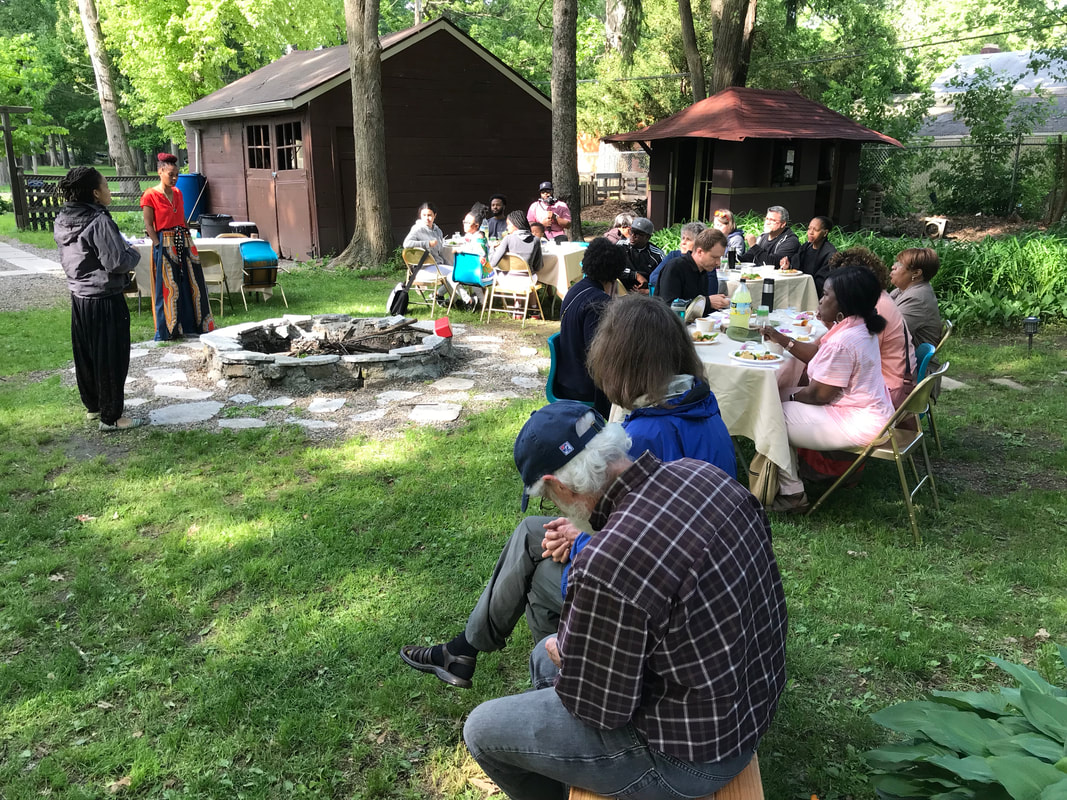|
Community Dinners at Hope House & Gardens, a new VEJ program for 2019, are proving to be popular with both neighbors and visitors to the neighborhood.
Both Community Dinners on the 2019 calendar so far (May and June) filled up to capacity. "People seem to really like the Community Dinner program, from the food to the guests to the setting to the speakers," said VEJ executive director BT Irwin. "That's really exciting because it means people are finding something that helps them make Earth justice a little more part of their lives, relationships, and work." VEJ garden program leader L'Oreal Hawkes-Williams came up with the idea for Community Dinners and manages the program. Each Community Dinner takes place at VEJ's Hope House & Gardens at James T. Hope Park in northwest Detroit. A local chef prepares a meal using as many ingredients as he or she can from VEJ's neighborhood garden and other neighborhood sources. A speaker brings a discussion topic that relates to VEJ's Earth justice mission, usually relating it to the people who live in the Hope Park neighborhood itself. At the first Community Dinner in May, Tommie Obioha of Detroit Sustainability Partners gave a talk on the City of Detroit's sustainability program for residents. In June, Shakara Tyler of Michigan State University's Regional Food Policy center led a discussion on African American agriculture in urban centers like Detroit. "We are blessed to have a donor who made this entire program possible, from the hours L'Oreal and our staff put into to organizing it, down to the honorarium we give the presenter and what we pay the local chefs to prepare the meal," said Irwin. Along with Eco-Eating Tours, hosting the neighborhood First Fridays Film Series, the Organic Sustainable Gardening program, Wonder Walks, and other programs, Community Dinners are an important part of how VEJ is growing a community around its mission of "prayer, education, and action for Earth." "We hope people can see what we're up to here," said Irwin. "Our most important work at VEJ is growing a community of people who are from different backgrounds, but who come together to pray, learn, and take action for Earth justice. And nothing is more important to forming a community than breaking bread together. That's what this is all about." The next Community Dinner takes place on Sunday, July 7, and will feature a discussion on the "interfaith table." Sign up here.
0 Comments
 Christ the King Service Corps volunteer Julia Hall helps some Hope House neighborhood kids learn about cooking vegetables. Christ the King Service Corps volunteer Julia Hall helps some Hope House neighborhood kids learn about cooking vegetables. After a year of full-time volunteer service at VEJ, Julia Hall is moving on to her next adventure in life. Hall, a member of Christ the King Service Corps, recently finished one year of placement at VEJ, spanning from June 2018 to the end of May 2019. She came to VEJ just weeks after graduating from the University of Dayton in Dayton, Ohio. "Julia is and was a gift straight from God," said VEJ executive director BT Irwin. "Along with [garden program leader] L'Oreal [Hawkes-Williams], Julia was the heart and soul of VEJ's presence in the Hope House neighborhood and VEJ's programs across the region." As part of the Christ the King Service Corps, Hall lived in a common house with other service corps members at Christ the King Catholic Church, just a short walk from Hope House & Gardens. As a service corps member, Julia volunteered 40 hours (and sometimes more) each week at VEJ. "Julia was our only full-time person on staff and our only staff person who lived in the Hope House neighborhood itself," said Irwin. "What showed to everyone is that her greatest joy was in relating to her neighbors here. She really loved them!" In addition to helping VEJ connect to its neighbors in Detroit's Brightmoor and Old Redford neighborhoods, Hall helped create and run other programs as well, including Eco-Eating Tours and Wonder Walks. She was a big part of helping Hawkes-Williams design and lead VEJ's Organic Sustainable Gardening program. This summer, Hall will move to Oregon, where she will attend graduate school at Oregon State University in Corvallis. She will study women, gender, and sexuality on full scholarship as a teaching assistant. "This year has been one of fun, excitement, and learning," said Hall about her placement at VEJ. "My growth, professionally and personally, through working at Voices for Earth Justice has meant so very much to me." A going-away party is in the works and details will be announced soon. If you're reading this, I bet you also read up a lot on things like climate change.
I mean, come on: You're reading a blog post on a website with the address "voices4earth.org." Unless you're my mom (Hi, Mom!), what other reason do you have to be here if you're not someone who cares deeply about Earth justice? So...do I win that bet? Do you keep track of things like climate change? At the risk of sounding like I have a gambling problem, here's another bet I'm sure I can win: Most everyone cares about the environment. Some more than others, but I'm pretty sure that most everyone--Democrat and Republican, old and young, rural and urban, rich and poor, religious and non-religious--care about the health of Earth. Yes, yes. Some are passionate while others are just passive. Some make Earth justice their full-time hobby or profession. More make do with buying Seventh Generation brand products at Meijer and rolling their blue container to the curb once a week. I think most people, though, settle for saying they'll get around to Earth justice. Someday. If you're the kind of person who puts energy, money, and time into Earth justice every day, those people who "make do" or settle for "someday" may drive you crazy. Alarm bells are clanging in your head as you look up from the latest climate change headlines in this morning's New York Times. "We're almost out of time!" you say. "People need to wake up and get with it!" And you're right. You're right. "Yes! I'm right! Damn right!" you say. "Why can't people see that Earth is in our hands?" Huh. Now there's a question. "Why can't people see that Earth is in our hands?" Yes. Why can't they? First of all, I will say again that I think they can. But one little word in your question makes a big difference to what happens next: "Our." There is a big difference between "Earth is in our hands" and "Earth is in my hands." Do you agree? It is true that Earth is in our hands. Few will disagree with that. But just who is part of that word "our"? If you're an American consumer or voter, you could take that "our" to mean the 327 million people who live in this country. The fact is, among the nations of the world, only China pollutes more than the United States. So, indeed, Earth is in "our" American hands. Or, you could take "our" to mean the 7.53 billion people who live on Earth. Nobody can deny that that many human beings makes a huge impact on the planet. But the word "our," while accurate, is neither encouraging nor inspiring. And it is unclear. The word does nothing to nudge people to take action. In fact, I think the word does the opposite. Here's what I mean: First of all, being part of an "our"--especially an "our" as big as the population of the United States or the world--allows individuals to make excuses: "Somebody else will do it." "What's the point? I'm just one of 327 million or 7.53 billion. What difference can I make?" You see, as long as Earth is in our hands, I don't have to get around to saying that it is in my hands. As long as Earth is in our hands, I can always say that it is somebody else's problem to solve: The government, multinational corporations, nonprofit organizations, scientists...whoever! And so the size of the problem (world destruction!) and the fact that the solution is in our 7.53 billion pairs of hands makes me feel like little old me is helpless! I am dis-couraged from even thinking about it let alone doing something about it. I settle for making myself believe that someone else will do something. Now, here I want to say that Earth justice has to be our problem to solve. Something as big as Earth justice demands all of us working together. We have to find a way to change big things like economies and public policy. There is simply no way around it. But big things like economies and public policy are made up of many, many little things. Or, to put it better: Many, many individuals. Want to go smaller? Just multiply those many, many individuals by the many, many choices each one of them makes each day. When you think about it that way, Earth justice is really what happens (or doesn't happen) as the entire human race makes trillions of choices on a daily basis. So, then, Earth really is in my hands. It just takes what we call faith to see it. Here's my point: The only way I will ever give energy, money, and time to "Earth in our hands" is if I first hold Earth is in my hands. "Our" is so big it excuses personal responsibility. But if I start with personal responsibility, if I hold Earth in my hands, it is much easier to join the collective "our." And that is exactly what we are trying to do at VEJ right now. Instead of overwhelming people with planet-sized problems that they feel helpless to solve, we are inviting them to hold--literally hold--Earth in the hands! I thought about this a couple of weeks ago as I helped plant flowers at VEJ's neighborhood garden in Detroit. I looked down and there it was: I was holding earth in my hands. I was holding life in my hands. In that moment, one average, ordinary guy was in a partnership, a relationship with Earth. I wasn't alone. Others were down on their hands and knees alongside me in the garden. We were having a moment of fellowship with each other and with Earth. It may sound weird to some, but the moment changed me a little. Gave me a little nudge and pat on the back as I turned a little more toward Earth justice. That's what we're doing at VEJ: Inviting people to join others in putting their hands into the soil, breathing the air, listening to the wind in the trees, looking carefully at the miracles all around them, tasting the fruit of the Earth. |
Categories
All
Archives
December 2021
|
Copyright © 2024 Voices for Earth Justice, nonprofit 501(c)(3). All Rights Reserved.
Mailing address: 15894 Greydale Street, Detroit, Michigan 48223 Email: info@voices4earth.org Phone: (313) 355-6042
Mailing address: 15894 Greydale Street, Detroit, Michigan 48223 Email: info@voices4earth.org Phone: (313) 355-6042


 RSS Feed
RSS Feed